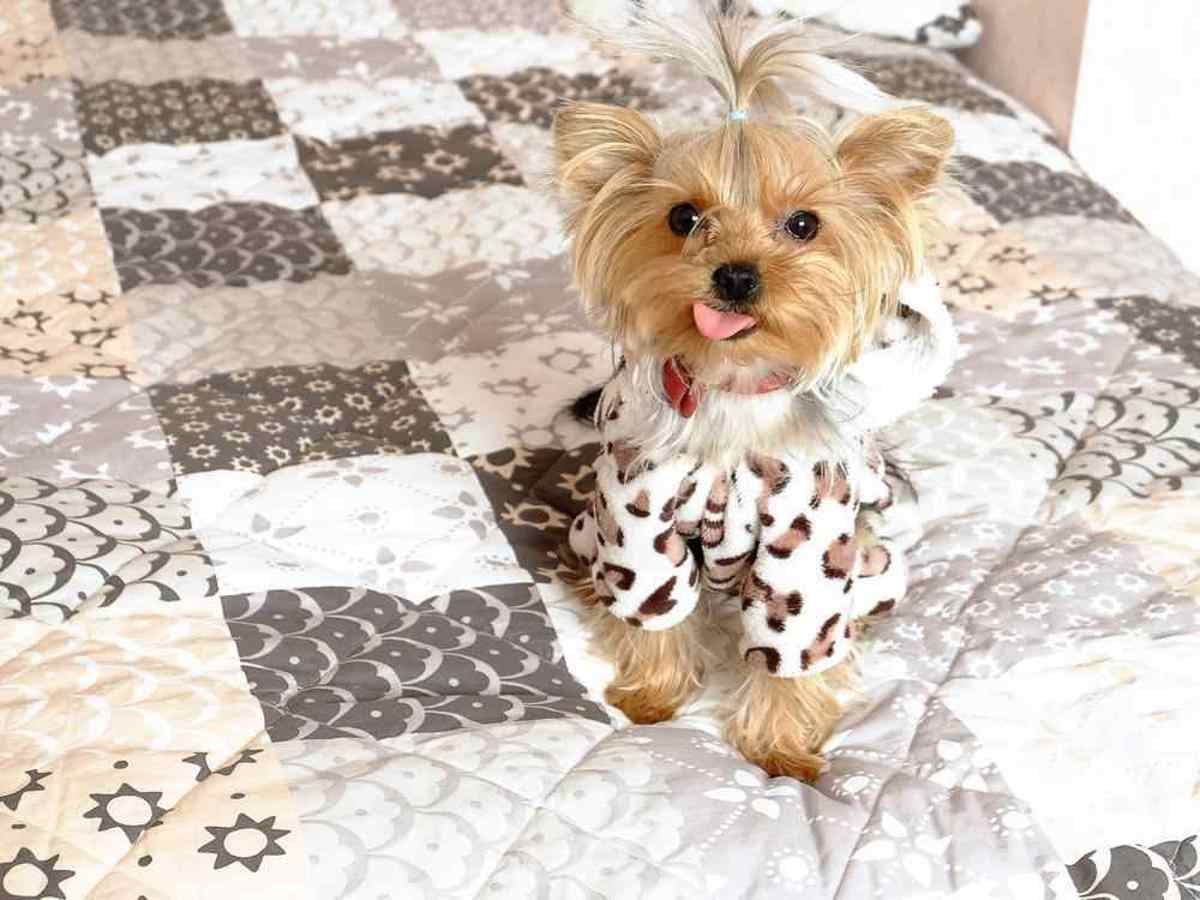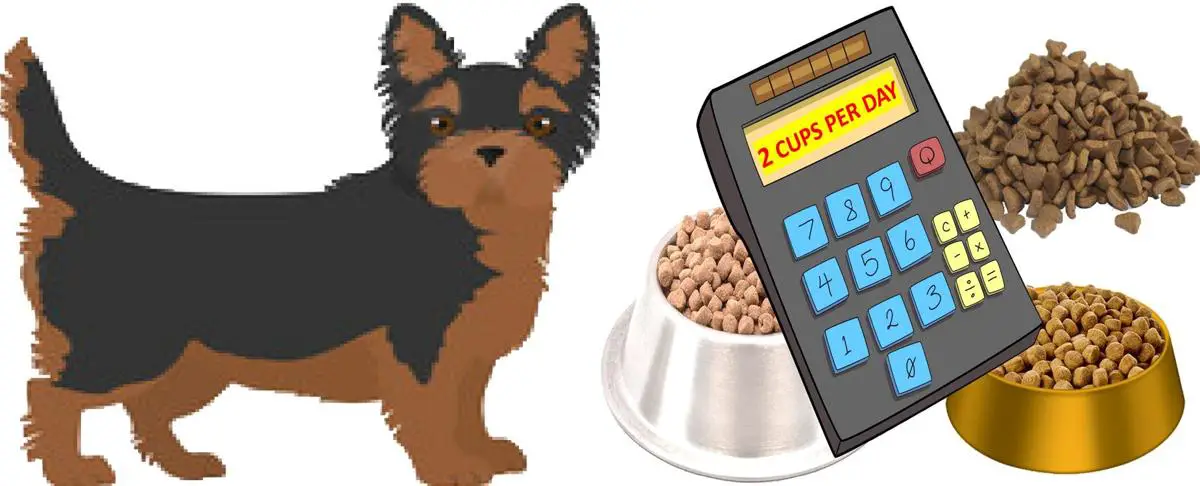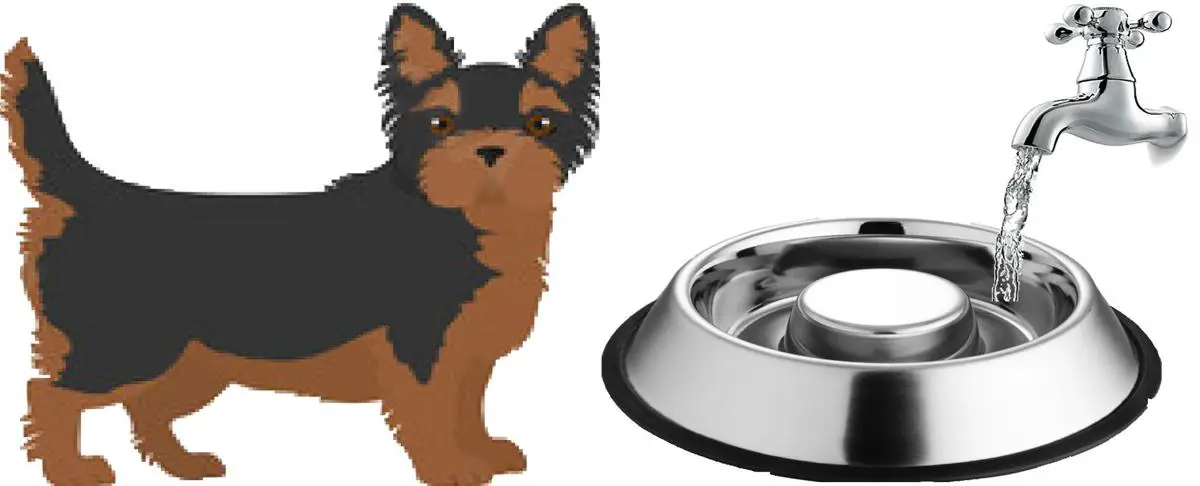Quick Links: Table of Contents
- Yorkshire Terrier Breed Overview
- History of the Yorkshire Terrier Breed. Where Yorkshire Terriers came from
- What the Yorkshire Terrier Looks Like
- How Much is the Yorkshire Terrier Puppy?
- Best Yorkshire Terrier Breeders
- Adopting or Rescuing the Yorkshire Terrier
- Yorkshire Terrier Growth
- What Colors do Yorkshire Terriers Have?
- The Temperament of the Yorkshire Terrier
- How Long Yorkshire Terriers Live
- Yorkshire Terrier Litter Size
- How Fast Yorkshire Terriers Can Run
- Good Names for Yorkshire Terriers
- How Intelligent are Yorkshire Terriers?
- How Popular are Yorkshire Terriers with New Dog Owners?
- Health Problems in Yorkshire Terriers and How to Prevent Them
- How to Take Care of Yorkshire Terrier
- Dog Breeds That Are Similar to Yorkshire Terriers
- Other Things to Know About Yorkshire Terriers
Yorkshire Terrier Breed Overview
The Yorkshire Terrier is a tiny-sized dog.
The adult Yorkshire Terrier stands 8 to 9 inches tall at the shoulder.
The Yorkshire Terrier belongs to the Companion Dogs group.
Dogs in the Companion Dogs group, like the Yorkshire Terrier, were bred to be companions for humans. Their main goal in life is to be with people, and they will be very sad if left to themselves for long hours day after day.
The fact that the Yorkshire Terrier belongs to the Companion Dogs group is one of the reasons why Yorkshire Terriers have the personality and temperament that they have.
The temperament of the Yorkshire Terrier is generally described as:
- Bold
- Confident
- Courageous
- Independent
- Intelligent
History of the Yorkshire Terrier Breed. Where Yorkshire Terriers came from
Yorkshire Terriers came from the Yorkshire area of England and became a developed breed in the 1900s.
This breed comes from a long line of Scottish Terriers that were imported from Scottland.
Scottish Terriers are still older and were bred to help hunt rodents and protect some flocks.
Yorkshire Terriers were smaller than Scottish Terriers and were eventually bred to showcase their long flowing locks and to be companions to people who liked smaller breeds.
The Yorkshire Terrier was recognized by the United Kennel Club in 1956 and the American Kennel Club earlier in 1885.
Yorkshire Terriers are a trusty breed and have been produced in several breeding programs worldwide.
Because they are so small, the number of jobs they can do as a working breed is very limited, and they do best as companions or therapy animals.
They are a highly trainable breed and can benefit from early socialization to avoid unwanted behaviors.
.
What the Yorkshire Terrier Looks Like
A Yorkshire Terrier is a small, tiny breed of dog with a long, silky coat.
Most coats of Yorkshire Terriers are two-toned and can be blue and tan, black and tan, black and gold, or blue and gold.
Sometimes a Yorkshire Terrier can look scruffy if it has a shorter kempt haircut, but mostly their coats are super soft.
Brushing and washing are often recommended to keep this breed`s coat healthy.
Being one of the world`s smallest dog breeds, it is important to introduce a Yorkshire Terrier to a home where it will be looked out for as accidents can happen readily with a dog this small around.
While Yorkshire Terriers can be friendly, they can also be feisty and tenacious.
They may also nip at children that mishandle them, so this breed should be monitored carefully around younger kids.
Yorkshire Terriers can be great for showing at kennel club events or even training for agility events.
They are energetic and happy dogs and like to be wherever their owners are.
This can be great for living in apartments or smaller spaces where the Yorkshire Terrier can thrive.
.
How Much is the Yorkshire Terrier Puppy?

The average price of a Yorkshire Terrier puppy is $2420. The price of a Yorkshire Terrier puppy ranges from $1600 to $2950.
A lot of factors determine the price of the Yorkshire Terrier. These factors include what health records the Yorkshire Terrier puppy has, the lineage of the Yorkshire Terrier puppy, the US state the breeder is located in, etc.
To estimate how much you can expect to pay for a puppy Yorkshire Terrier based on the many factors that determine the price of the Yorkshire Terrier puppy, check out our calculator that lets you estimate how much you should expect to pay for the Yorkshire Terrier puppy based on what you want in the puppy.
When looking to buy a puppy, look at buying a puppy only from well-established breeders that breed puppies primarily for the love of the Yorkshire Terrier breed, and secondarily for profit. Do not buy a puppy from a puppy mill. Puppy mills mass-produce puppies in bad living conditions for maximum profit.
You may also consider adopting instead of buying a puppy. Adoption costs are very low compared to the price of a puppy.
Best Yorkshire Terrier Breeders
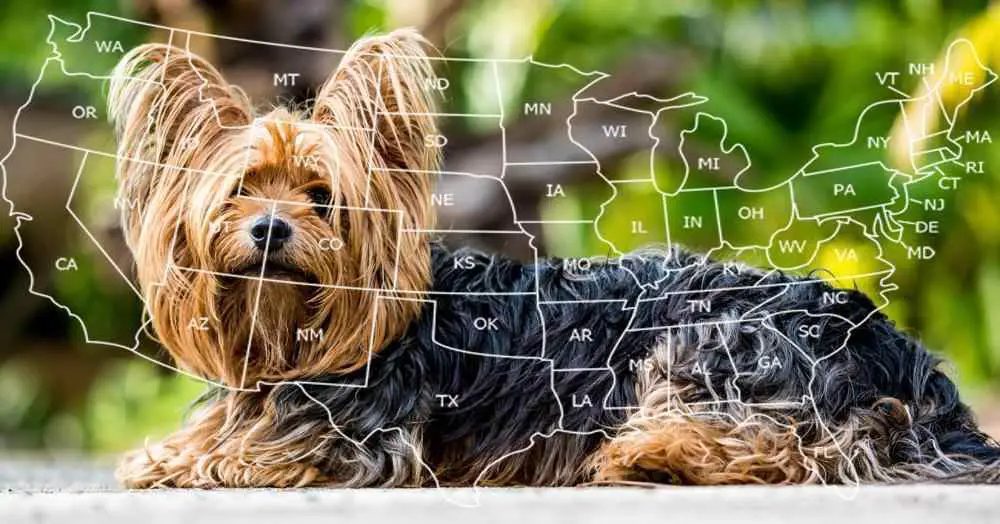
We have researched reputable Yorkshire Terrier breeders that you can buy a puppy.
Go to this page for our complete list of reputable Yorkshire Terrier breeders in various states in the United States.
On this page, you will see how much these breeders sell their puppies for, and how many puppies they have available.
A few of these breeders are listed below.
Svetlana Borodayev
Puppy Price: Check with breeder
Pat`s Yorkshire Terriers
Puppy Price: Check with breeder
Simply Perfect Yorkies
Puppy Price: $2000-$2500
Krista Kerlick
Puppy Price: $3,500.00
Crystal Vela
Puppy Price: $1200
Adopting or Rescuing the Yorkshire Terrier
You may consider adopting a dog instead of buying a puppy. Many dogs, Yorkshire Terriers included, are currently available for adoption in your local dog shelters.
These helpless but adorable dogs are waiting in dog shelters hoping that someday someone will rescue them. Dog adoption costs are lesser than the cost of a new puppy. Dog adoption costs are usually around $300 or even less.
In addition to your local dog shelter, another good place to find dogs that are available for adoption is petfinder.com.
Below is an adorable Male Yorkshire Terrier named Cooper A096515 that is currently available for adoption on Petfinder.com. You can find other lovely Yorkshire Terriers like Cooper A096515 on pefinder.com.
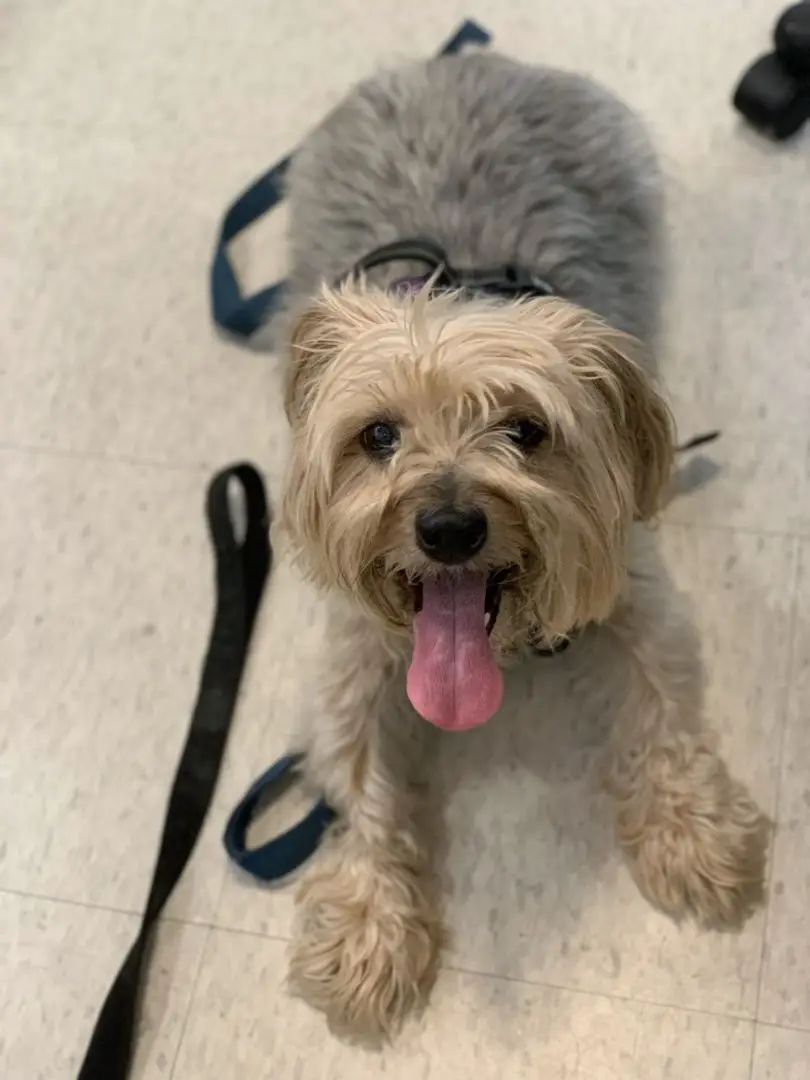
Rocky is the name of another Yorkshire Terrier (Male) on petfinder.com that is looking for a new forever home.
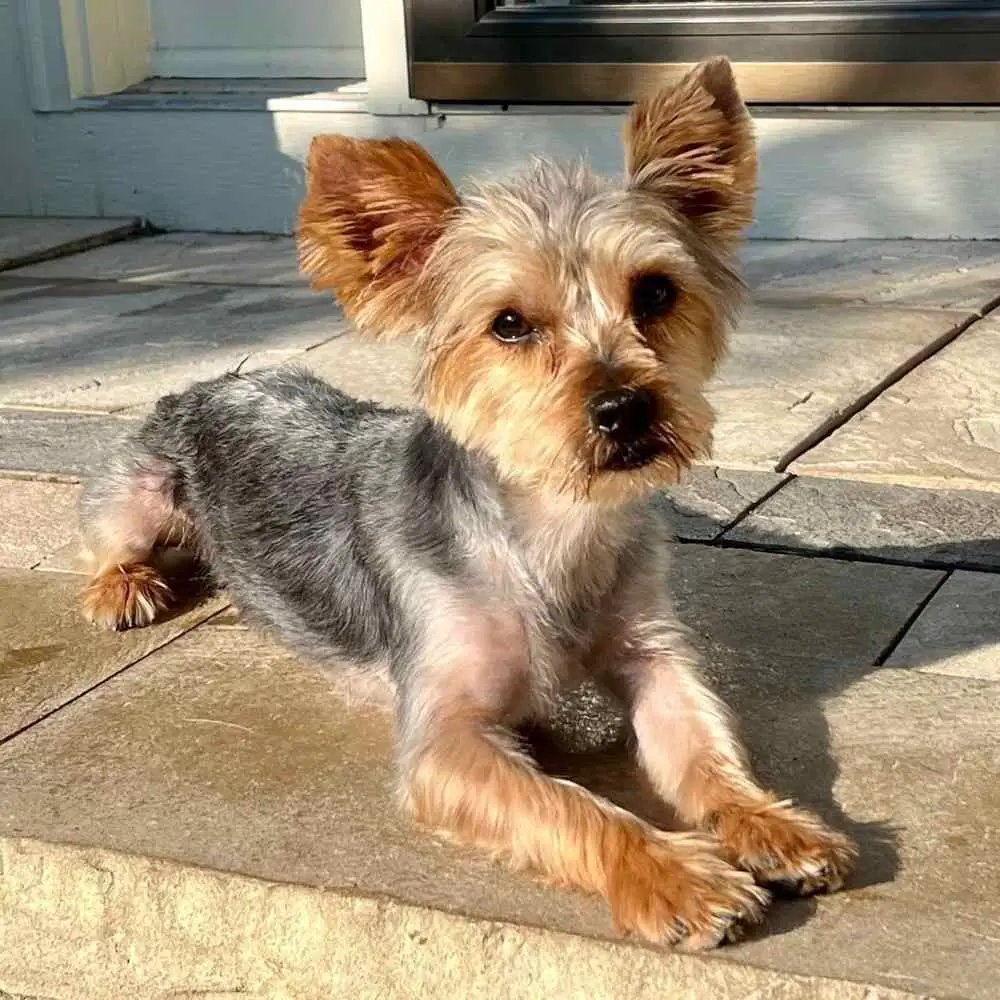
You can find more Yorkshire Terriers that are available for adoption on petfinder.
Yorkshire Terrier Growth

New Yorkshire Terrier owners need to know about the growth of their Yorkshire Terriers. This will help them plan their living spaces accordingly.
Also, knowing the typical growth pattern of the Yorkshire Terrier will help new owners catch the abnormal growth of their Yorkshire Terrier early.
See our calculator for predicting how big your Yorkshire Terrier puppy will get. You will also learn about the typical weight of the Yorkshire Terrier at different ages and how to catch abnormal growth in your Yorkshire Terrier
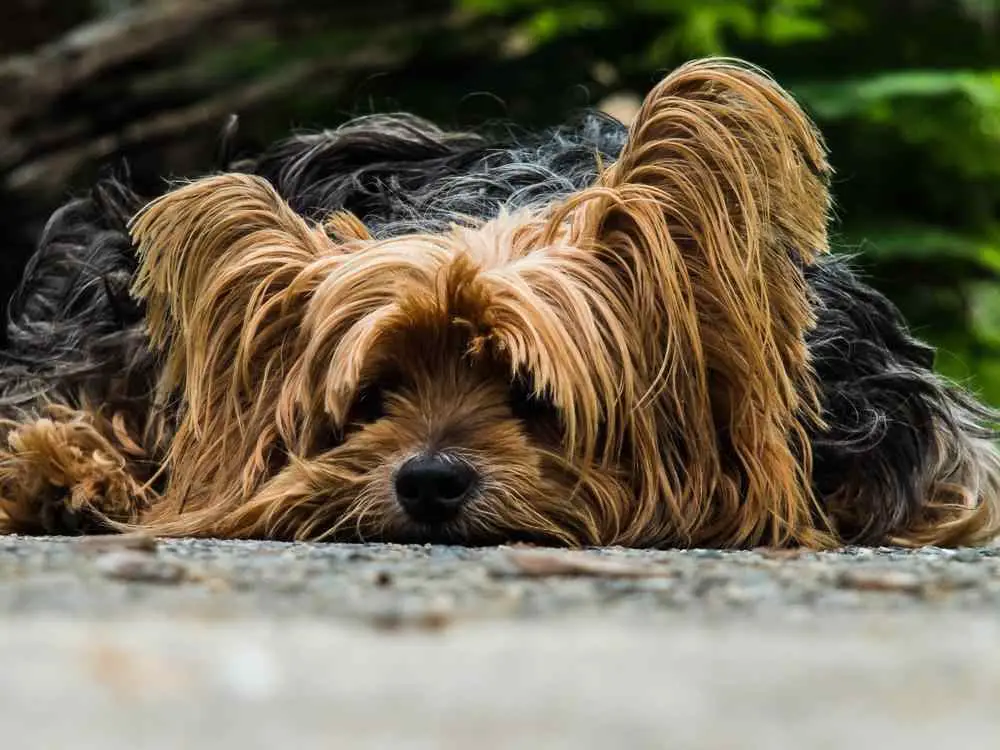
What Colors do Yorkshire Terriers Have?
Yorkshire Terriers come in the following beautiful primary colors:
- Brown / Chocolate
- Red / Chestnut / Orange
- Bicolor
- Yellow / Tan / Blond / Fawn
- Black
- Golden
- Gray / Blue / Silver
- Tricolor (Brown, Black, & White)
- Apricot / Beige
- White / Cream
- Sable
Yorkshire Terriers come in the following lovely secondary colors in addition to their primary colors:
- White / Cream
- Apricot / Beige
- Black
- Yellow / Tan / Blond / Fawn
- Brown / Chocolate
- Gray / Blue / Silver
- Red / Chestnut / Orange
- Golden
- Tricolor (Brown, Black, & White)
- Sable
- Bicolor
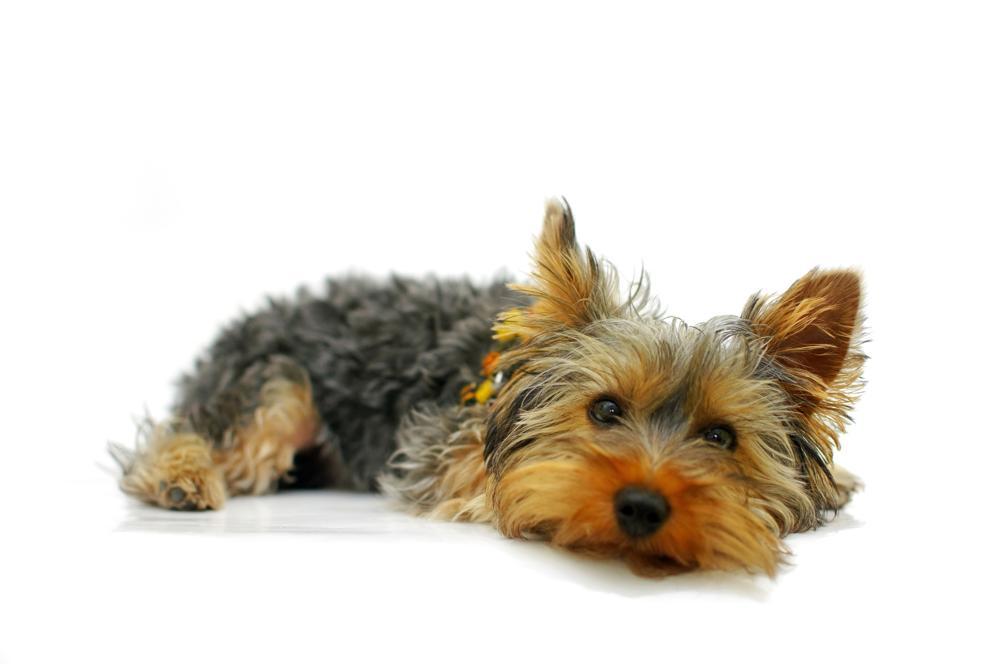
The Temperament of the Yorkshire Terrier
The temperament of the Yorkshire Terrier based can be summarized as in the table below.
The table shows the scores of the Yorkshire Terrier for 13 important dog behavioral factors.
We obtained these scores by analyzing raw data from the C-BARQ dog personality survey tool. The higher the score of a dog for a factor, the worse the temperament of the dog regarding that factor.
The C-BARQ tool was developed by researchers from the University of Pennsylvania, and it is a scientific tool that is used worldwide for reliably measuring the temperament of dog breeds.
See our complete analysis of the temperament of the Yorkshire Terrier here.
| Factor | Score |
|---|---|
| Attachment Attention Seeking | 75.1 percent |
| Separation Related Behavior | 66.4 percent |
| Energy Level | 58.2 percent |
| Dog Directed Fear | 56.6 percent |
| Dog Directed Aggression | 55.6 percent |
| Stubbornness | 54.9 percent |
| Excitability | 52.7 percent |
| Stranger Directed Aggression | 52.6 percent |
| Nonsocial Fear | 51.1 percent |
| Dog Rivalry | 50.9 percent |
| Stranger Directed Fear | 48.4 percent |
| Touch Sensitivity | 45.7 percent |
| Prey Drive | 43.5 percent |
| Owner Directed Aggression | 30.3 percent |
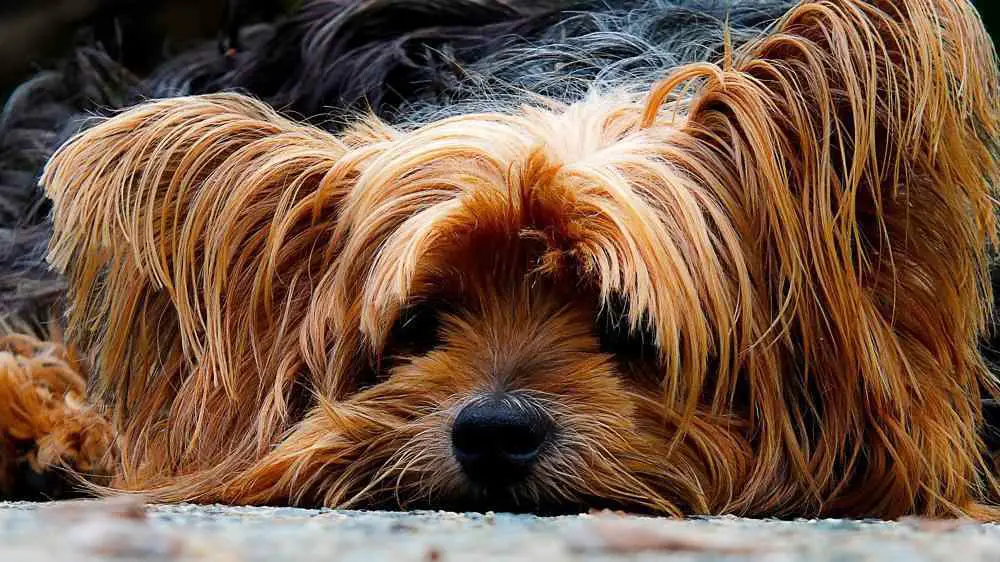
How Long Yorkshire Terriers Live
The lifespan of the Yorkshire Terrier is typically from 12 to 15 years.
Moreover, a few years back, veterinarian researchers performed a scientific study to determine the lifespan of the Yorkshire Terrier. In this study, the scientists collected data on how long 46 pet Yorkshire Terriers lived.
From the study, it was found that Yorkshire Terriers have an average lifespan of 12.6 years. Furthermore, the study found that it is not uncommon for Yorkshire Terriers to live as long as 17.3 years.
Note that you need to put in some effort if you want your Yorkshire Terrier to live long.
Yorkshire Terriers live long if they eat well, drink well, exercise well, and visit the veterinarian regularly.
There are also dog supplements that you can give your Yorkshire Terrier to improve your Yorkshire Terrier`s quality of their life.
Click here to learn more about how to make your Yorkshire Terrier live long.
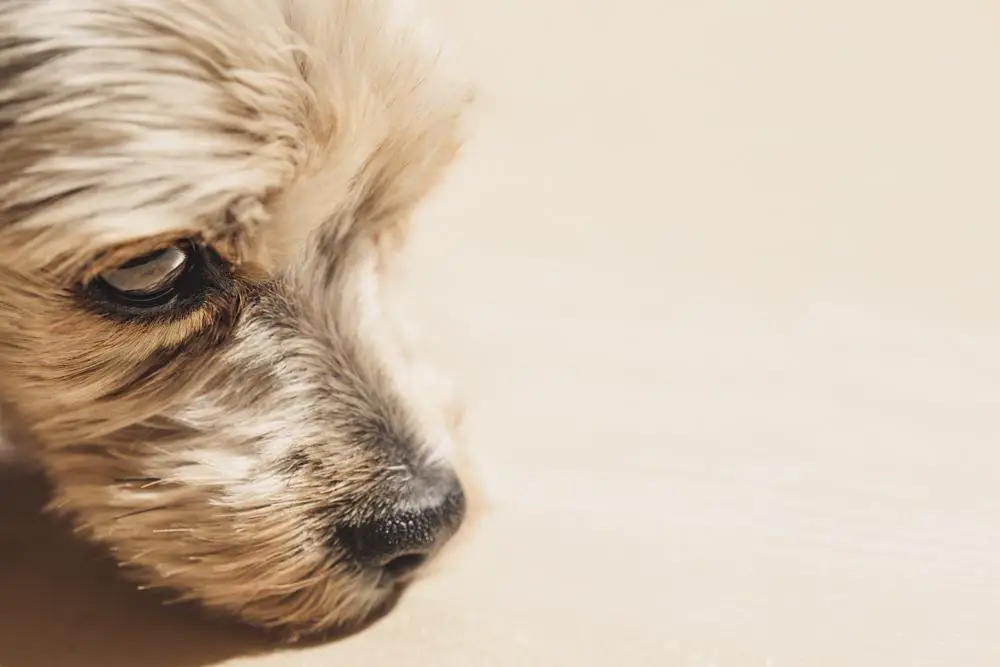
Yorkshire Terrier Litter Size
Researchers from the Norwegian School of Veterinary Science did a study where they counted the numbers of puppies in 35 different Yorkshire Terrier birth litters.
From this study, the researchers found that the average number of puppies that Yorkshire Terriers can have is 3 puppies. Also, the Yorkshire Terrier can have as few as 1 puppies per litter and as many as 6 puppies per litter.
The number of puppies that the Yorkshire Terrier will have depends on factors such as the age of the Yorkshire Terrier, the method of pregnancy, etc.
Click here to see our calculator for predicting how many puppies your Yorkshire Terrier will have and how the litter size of the Yorkshire Terrier compares to the litter size of other dog breeds.
How Fast Yorkshire Terriers Can Run
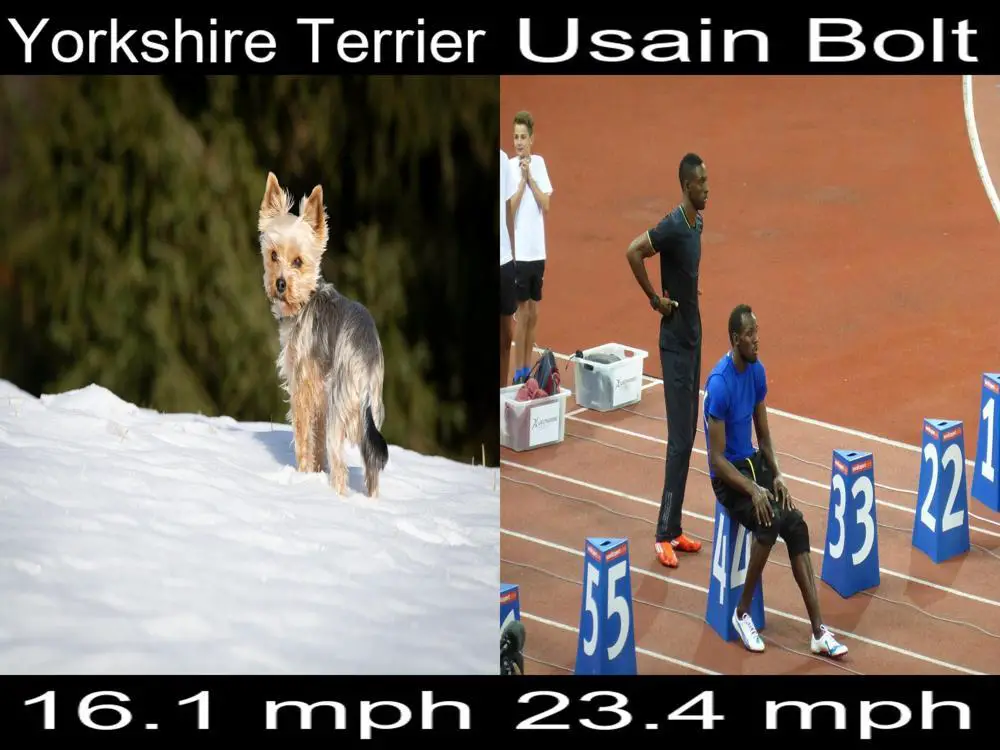
How fast a dog breed can run is a good measure of how athletic the dog breed is.
The American Kennel Club (AKC) regularly conducts dog running competitions. The AKC records the running speed of competing dogs in these competitions. These competitions are open to all dog breeds.
Based on our analysis of the speeds of 28 different Yorkshire Terriers, the average speed of the Yorkshire Terrier is 16.1 mph (25.9 kmph).
The fastest speed on AKC record that the Yorkshire Terrier ran in a race is 20.67 mph (33.3 kmph) and the minimum speed on record in a race for a Yorkshire Terrier is 7.5 mph (12.1 kmph).
Click here to see how the speed of the Yorkshire Terrier compares to the speed of other dogs and other mammals such as cats, horses, humans, etc.
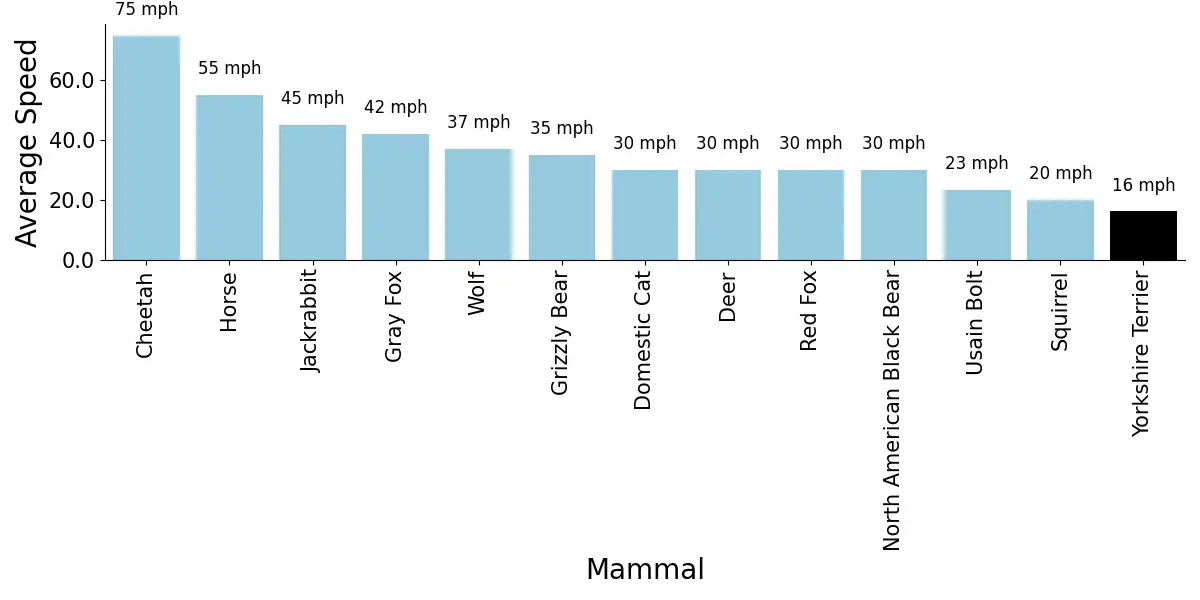
Good Names for Yorkshire Terriers
Here are some really good names that are typical for the Yorkshire Terrier ranked by popularity:
- Teddy
- Rocky
- Johnny
- Bear
- Charlie
- Dolce
- Dog
- Buddy
- Max
- Toto
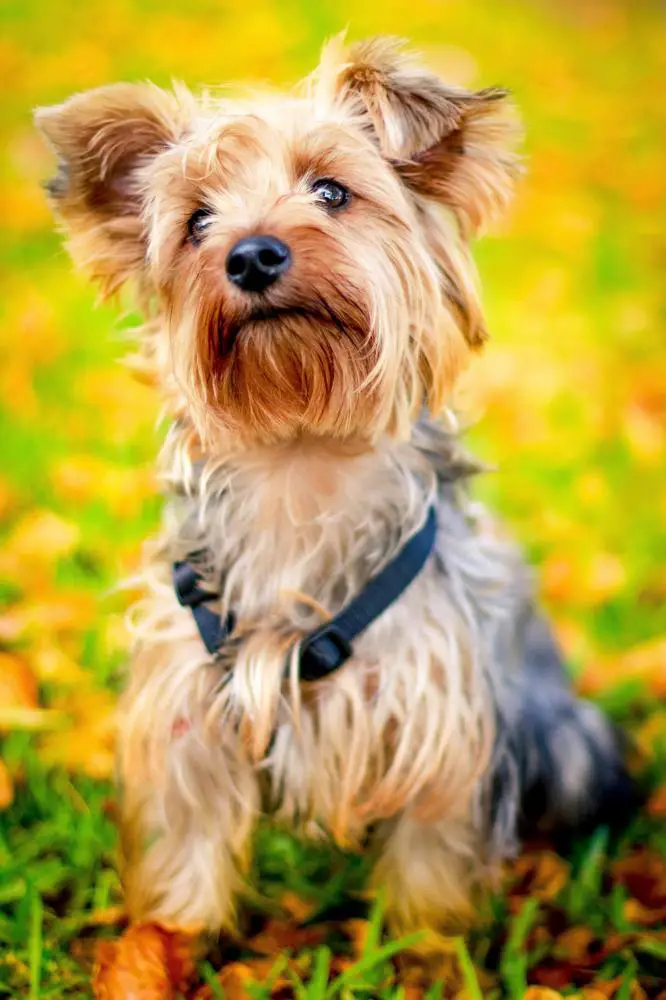
How Intelligent are Yorkshire Terriers?
| Yorkshire Terrier | |
|---|---|
| Intelligence Rank | 27 out of 130 dog breeds |
| Trainability | Tend To Learn New Commands After 15 To 25 Repetitions |
According to Prof. Stanley Coren, a Canadian psychology professor/dog trainer, the total intelligence that a dog demonstrates is the addition of three types of intelligence. These intelligence types are:
- Instinctive Intelligence: This is the natural intelligence that comes from instinct. For example, dog breeds that have been historically bred to be guard dogs will have a high `guarding` intelligence compared to dogs that were not bred for guarding.
- Adaptive Intelligence (learning and problem-solving ability): This indicates what a dog can learn to do for himself or herself. Adaptive intelligence is specific to each dog, and not breed specific. You can improve your dog`s adaptive intelligence by investing time to train your dog.
- Working/Obedience Intelligence: This type of intelligence is breed-specific. Certain dog breeds tend to have higher working/obedience intelligence than some other breeds. This intelligence is the closest to what we might call school-learning ability and it is based upon what the dog can learn to do when instructed by humans. This type of intelligence can be measured for each dog breed and compared to that of other dog breeds.
Professor Stanley Coren measured and ranked the working intelligence of about 130 different dog breeds.
Prof. Coren found that the Yorkshire Terrier has an obedience intelligence rank of 27 out of 130 dog breeds. Thus, Prof. Coren put Yorkshire Terriers in the `Above Average Working Dogs` category.
This means that Yorkshire Terriers tend to learn new commands after 15 to 25 repetitions.
However, we should mention that a dog should not be judged based on its intelligence alone. There are other important factors you need to consider when deciding on which dog breed to get. These other factors include sociability, adorability, and compatibility of the dog breed with your lifestyle.
See the intelligence ranking of some other dog breeds below:
| Breed | Intelligence Rank |
|---|---|
| Standard Poodle | 2 |
| Golden Retriever | 4 |
| Shetland Sheepdog | 6 |
| Australian Cattle Dog | 10 |
| Weimaraner | 21 |
| Irish Water Spaniel | 24 |
| Vizsla | 25 |
| Samoyed | 33 |
| Cairn Terrier | 35 |
| American Foxhound | 46 |
| Rhodesian Ridgeback | 52 |
| Akita | 54 |
| Norfolk Terrier | 56 |
| Pug | 57 |
| Maltese | 59 |
| Italian Greyhound | 60 |
| Shih Tzu | 70 |
| Beagle | 72 |
| Chow Chow | 76 |
| Afghan Hound | 79 |
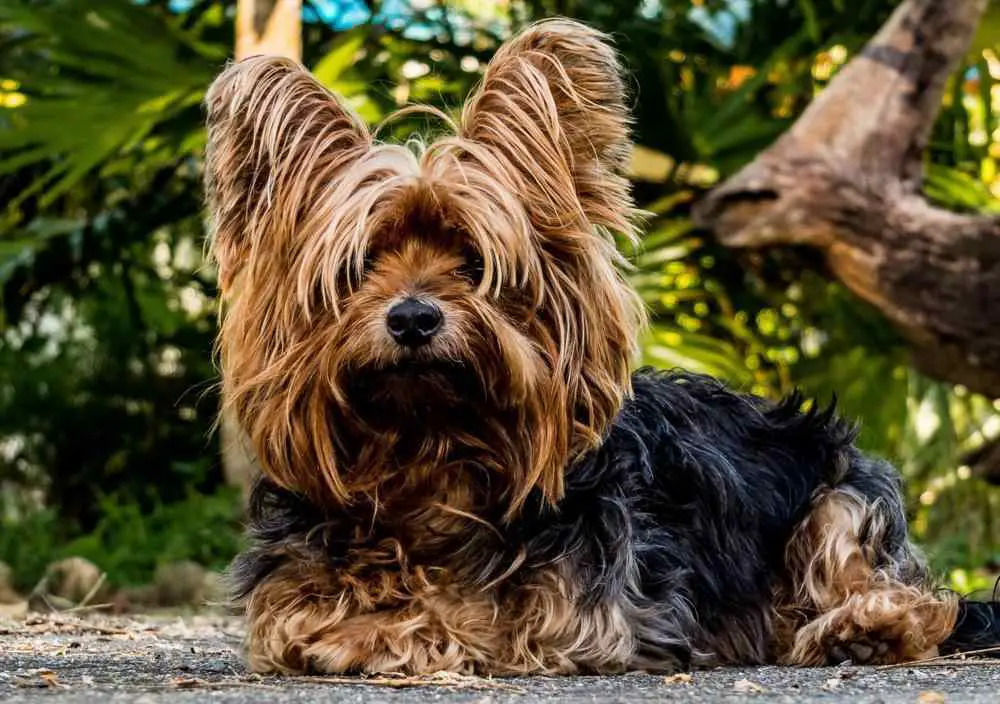
How Popular are Yorkshire Terriers with New Dog Owners?
Every year, the American Kennel Club (AKC) publishes information on how popular a dog breed is in that particular year. The AKC gets the popularity information of a breed from how many dogs of that breed the owners register with the AKC every year. The AKC collects this data for about 200 dog breeds.
The graph below shows the popularity trend of the Yorkshire Terrier.
The popularity of the Yorkshire Terrier averaged over the years is Number 9 out of about 200 dog breeds.
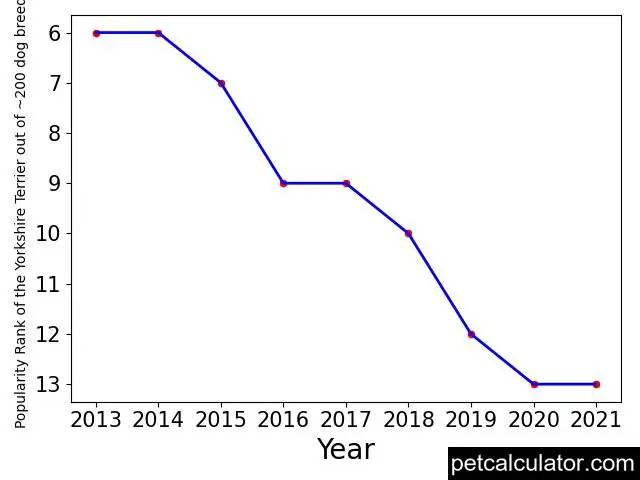
Do not get a dog breed just because it is a popular dog breed. And do not reject a dog breed just because it is an unpopular breed.
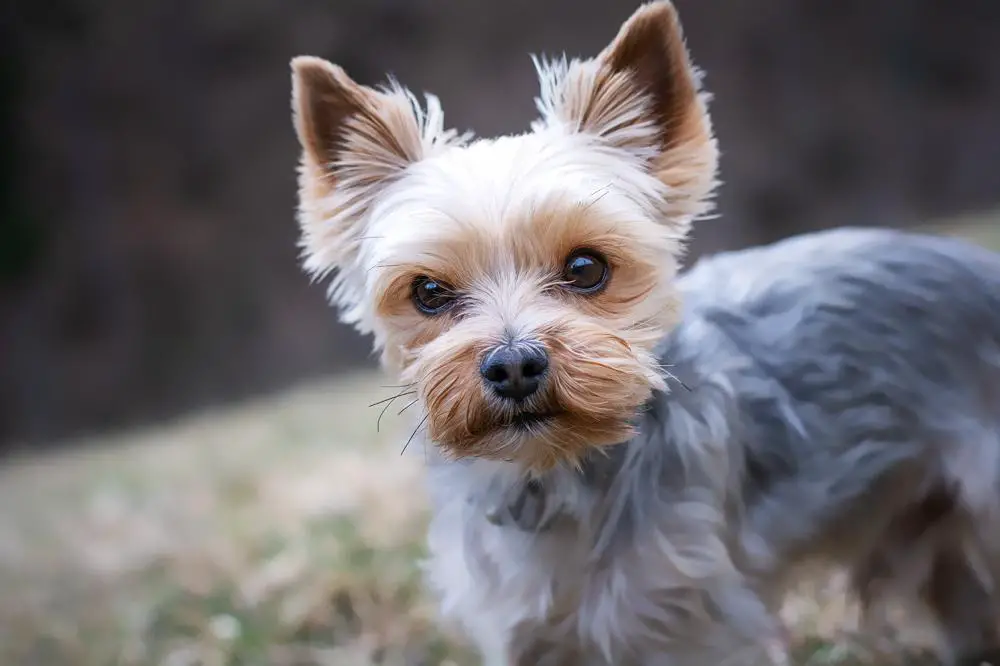
Health Problems in Yorkshire Terriers and How to Prevent Them
Every dog breed has its own set of health problems that it tends to develop. There is nothing like a perfect dog breed.
The Yorkshire Terrier is prone to certain genetic health conditions. The Orthopedic Foundation for Animals (OFA) is an organization that keeps track of genetic health problems in dog breeds.
From the extensive records that the OFA keeps, the OFA knows what health problems each dog breed is naturally prone to develop.
Hence, the OFA recommends which health screening breeders should perform on a dog breed to make sure that the breeders won`t breed `defective` dog parents that can pass down defective genes to their puppy offspring.
If you want a Yorkshire Terrier puppy that will grow up to be healthy, make sure that your Yorkshire Terrier breeder screens your puppy or your puppy`s parents for the health problems that the OFA recommends for your puppy`s breed. This will increase the chances that your puppy is free from genetic defects.
The following are the health tests that Orthopedic Foundation for Animals (OFA) recommends that breeders should screen Yorkshire Terriers for:
- Autoimmune thyroiditis
- Cornell DNA Bank
- DNA Repository
- Eye Examination- Prior to the onset of breeding, recommend evaluations at 1, 3, and 6 Years of Age.
- Hip Dysplasia
- Legg-Calve-Perthes
- Patellar Luxation
You can find out more about OFA`s recommended tests for Yorkshire Terriers here.
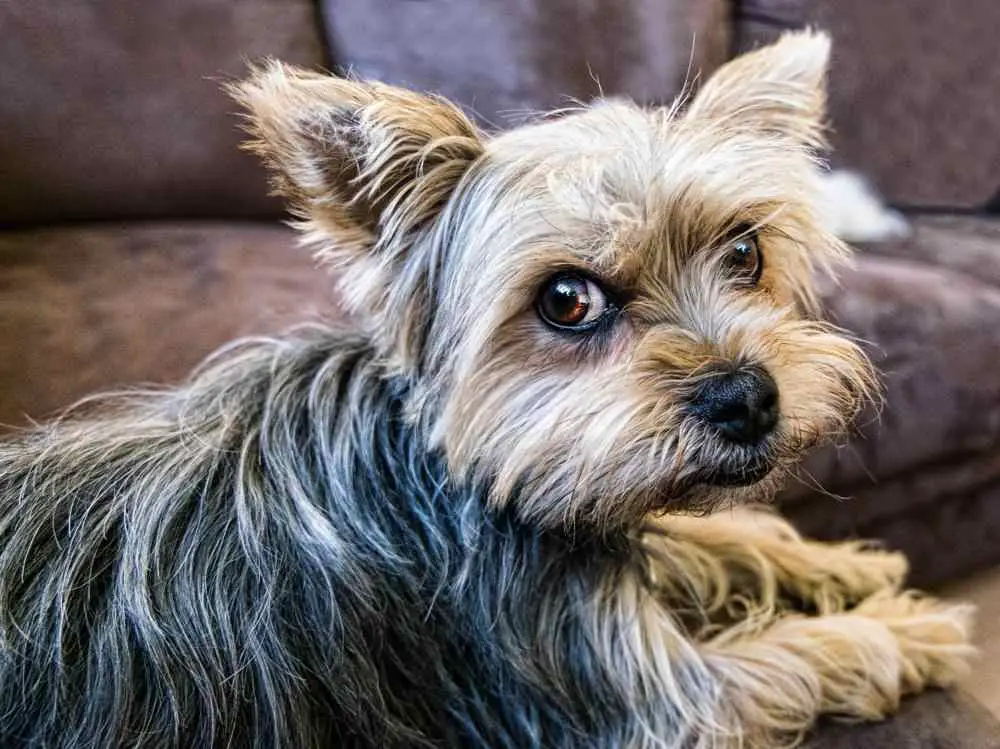
How to Take Care of Yorkshire Terrier
To take good care of your Yorkshire Terrier, you need to make sure that you groom your Yorkshire Terrier regularly.
Secondly, you need to find a veterinarian in your area that will routinely check the health status of your Yorkshire Terrier regularly, and give you appropriate recommendations on your Yorkshire Terrier`s preventative care.
Thirdly, you need to commit some time to exercise your Yorkshire Terrier daily. Regular exercise helps improve the health and quality of life of your Yorkshire Terrier.
Also, you need to feed your Yorkshire Terrier high-quality dog food, and the food should be of the right amount to prevent your Yorkshire Terrier from getting overweight or underweight.
See our recommendations on what to feed the Yorkshire Terrier and how much food to feed the Yorkshire Terrier at different life stages.
Finally, you need to make sure that your Yorkshire Terrier has access to clean water all the time. See our recommendations on how much water your Yorkshire Terrier needs to drink at different ages.
Dog Breeds That Are Similar to Yorkshire Terriers
If you have not made up your mind on which dog breed to get, you may also want to consider some other dogs similar to the Yorkshire Terrier.
We crunched the numbers and found that the following dog breeds that have similar behavior and temperament as the Yorkshire Terrier:
- Affenpinscher (74 percent match with Yorkshire Terrier). Learn more about the Affenpinscher here.
- Lhasa Apso (75 percent match with Yorkshire Terrier). Learn more about the Lhasa Apso here.
- Lhasapoo (75 percent match with Yorkshire Terrier). Learn more about the Lhasapoo here.
- Chorkie (83 percent match with Yorkshire Terrier). Learn more about the Chorkie here.
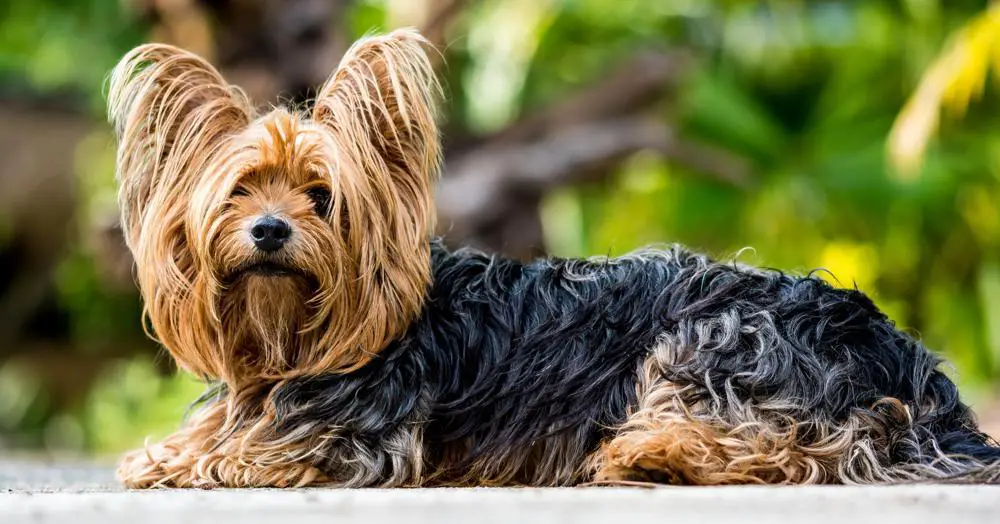
Other Things to Know About Yorkshire Terriers
Here are some of the very important characteristics of the Yorkshire Terrier that you need to know about the Yorkshire Terrier breed:
